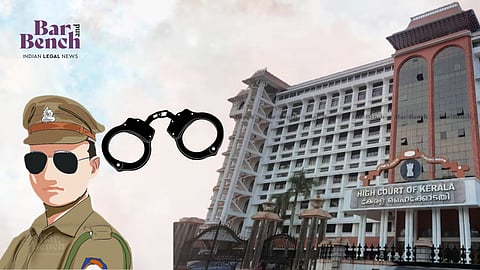
- News
- Columns
- Interviews
- Law Firms
- Apprentice Lawyer
- Legal Jobs
- हिंदी
- ಕನ್ನಡ

The Director General of Police (DGP) of Tamil Nadu (TN) informed the Kerala High Court on Friday that a circular has been issued with detailed guidelines to govern inter-state arrests so that there is compliance with legal procedures when persons are arrested from territories outside the State [N Prakash v Shankar Jiwal IPS & anr].
The development came about after a man named N Prakash filed a contempt of court petition, alleging that the Inspector of Police at Puliangudi Police Station in Tamil Nadu violated the directions given by the Supreme Court in DK Basu v State of West Bengal while arresting him on July 28 from his residence in Kerala.
A Bench of Justices Anil K Narendran and PG Ajithkumar had earlier directed the Senior Government Pleader to get instructions while also issuing notice to TN DGP, Shankar Jiwal (IPS) and Circle Inspector of Police of Puliangudi, M Balakrishnan.
In response, the DGP of Tamil Nadu submitted a counter-affidavit yesterday, stating that a detailed circular with guidelines for cross-border arrests has been issued to ensure compliance with legal procedures in future.
The DGP added that district unit officers have been instructed to monitor compliance with these guidelines to avoid future violations. He also requested the Court to close the contempt proceedings against Tamil Nadu police, asserting that steps have been taken to uphold legal protocol.
The circular dated November 13 outlines specific steps for TN police officers who conduct investigations and arrests outside Tamil Nadu.
The following are the guidelines from the circular:
Officers must document the reasons for arrests in writing, explaining that they are satisfied that there is a need to make the arrest. Such officers should also get prior permission from a superior officer either in writing or verbally in urgent cases.
Officers must record details of the team, purpose, vehicle and departure time in the Daily Diary of the police station.
A woman police officer must be included in the team when the arrestee is a female. Officers must wear uniforms and bear name tags for identification.
Officers must contact the jurisdictional police station in the other State, inform the local police of their presence, seek assistance, and make an entry at the police station. Translated copies of relevant documents must also be carried.
Searches must comply with the requirements of Sections 100 and 103 of the Code of Criminal Procedure (CrPC), with neighbourhood witnesses present. Officers must also adhere to Sections 41B (procedure for arrest by a police officer), 50 (informing arrested person reasons for their arrest and right to bail), and 50A (inform a friend or relative about their arrest) of CrPC, as well as the Supreme Court’s DK Basu guidelines while making arrests.
An arrest memo must document the time, date and the relative or friend informed about the arrest and any seized items must be recorded with witnesses.
If needed, the arrested person must be produced before the nearest magistrate within 24 hours, excluding travel time, for a transit remand with case details and related documents presented to the magistrate as per Article 22(2) of the Constitution.
Upon returning, officers must inform the jurisdictional police station about the investigation, recovered items and actions taken.
Accused persons should undergo a medical examination, either at the jurisdictional station or at the arrest location in exceptional cases.
The vehicle logbook must detail whether the vehicle was official or private, its driver, and its arrangement. The use of official vehicles should be prioritised.
The matter will be heard by the Kerala High Court again next week.
The petitioner, N Prakash appeared in-person.
Special Government Pleader P Narayanan along with Additional Public Prosecutor A Thiruvadi Kumar appeared for the TN DGP.
Advocate TV George represented M Balakrishnan, the Circle Inspector of Puliangudi.